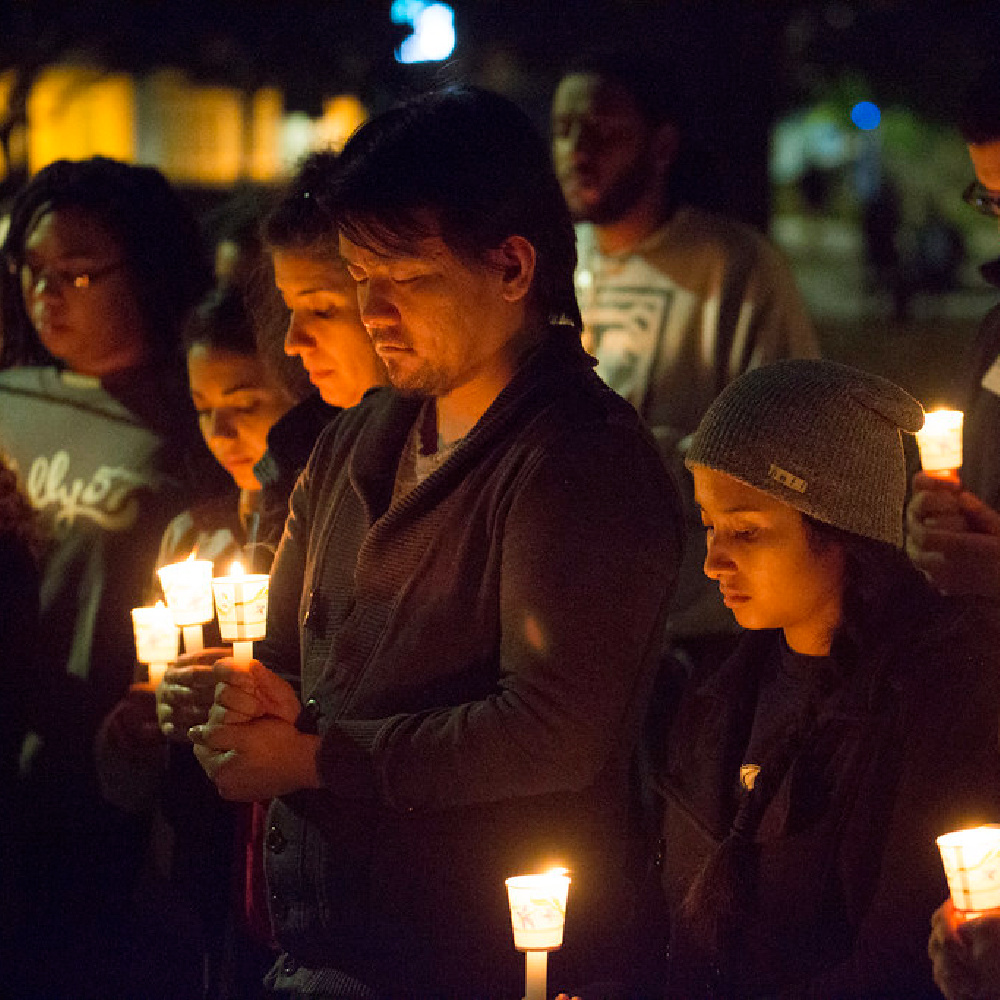During this past year, there has been a lot of discussion of allyship and what it means to be an ally to marginalized groups like LGBT+ members of the Church. But there has not been nearly as much discussion of discipleship and what it means to be a disciple of the Savior Jesus Christ.
Some will argue that these are synonymous. Allyship and discipleship have some obvious similarities. Both involve reaching out, including, and helping those at the margins. But despite the similarities, there are key differences as well—at least at present, with the current norms of modern allyship.
We argue here that the world’s template for what it means to be “allies” is grounded in expressive individualism, which not only hands us a very different story at the center of our lives, it offers us a very different definition of inclusion, love, and identity. The social template of “allyship” leads us to see anything less than affirmation, celebration, and dismantling norms around gender and sexuality as unloving and unkind.
By contrast, discipleship involves seeking a whole-souled, single-minded commitment to Christ, and also a whole-souled commitment to the community of saints that bears Christ’s name and wields divine authority. Let’s unpack the implications of these diverging meanings across some of the many facets of this sexuality conversation.
(1) Diverging understandings of identity
It’s in the previously noted “expressive individualism” that allyship looks for a foundation of identity. Expressive individualism assumes that personal authenticity is our highest priority and that moral autonomy is the highest good in life. Expressive individualism defines love as the absence of judgment and as an affirmation and celebration of whatever ways you differ from the community. As Steve Wilkens and Mark Sanford explain, expressive individualism “worships the freedom to express our uniqueness against constraints and conventions.” Allyship and discipleship both embrace the doctrine of inclusion, but understand that doctrine differently.
As such, our most central identity is centered on our primordial relationship with God as our Father. As President M. Russell Ballard has taught, “May I remind you that there is one important identity we all share now and forever, one that we should never ever lose sight of, and one that we should be grateful for. That is that you are and have always been a son or daughter of God with spiritual roots in eternity. First and foremost, you are and always will be a spirit child of God.” That is our core identity according to the restored gospel of Jesus Christ.
Furthermore, a man might also say “I am also my parent’s son, my wife’s husband, and my children’s father.” Our identities as people are bound up in relational duties towards each of these people in our lives. From this vantage point, if we step away from these core commitments, we are, in a sense, stepping away from ourselves. We are forsaking the core of who we really are. Our covenants as a member of the Church, our callings in the local congregation, our ministerial responsibilities, are also central parts of our identity and purpose. Identity and meaning are found and bound up in commitment.
By contrast, expressive individualism embraces what Philip Rief refers to as the “psychological man,” where our identities are defined by the contents of our minds—by our thoughts, desires, inclinations, etc. For example, we are defined by what we desire or are inclined towards. A teenager who wants to be a rockstar is—in pursuing those aspirations —stepping into their true identity, being true to themselves. Their desires and wishes are the “real them” that they then ought to actualize in their lives.
In this way, from the perspective of expressive individualism, your pre-existing relationships and the commitments you make take a back seat to your thoughts and feelings. Those thoughts and feelings become who you are. From this view, human flourishing is found in publicly living out our inner thoughts and feelings in as full a manner as possible. Covenants, commitments, and relationships that don’t acknowledge or celebrate those thoughts and feelings are seen as stifling your true self.
By contrast, as disciples of Jesus Christ, we are called to follow Christ. As C.S. Lewis explained in Mere Christianity:
To become new [persons] means losing what we now call ‘ourselves.’ Out of ourselves, into Christ, we must go. His will is to become ours and we are to think His thoughts, to ‘have the mind of Christ. … The more we get what we now call ‘ourselves’ out of the way and let Him take us over, the more truly ourselves we become. … Our real selves are all waiting for us in Him. The more I resist Him and try to live on my own, the more I become dominated by my own heredity and upbringing, and natural desires. … It is when I turn to Christ, when I give myself up to His Personality, that I first begin to have a real personality of my own.
Discipleship does not mean that we lose all of the things that make us distinct. It does not require us to ignore our unique and diverse heritage, cultures, and skills. But it requires placing these things on the altar for the service of God rather than for the service of self. It requires us to abandon any part of our expressive individualism that is incompatible with God’s will for us. This process is not easy. In fact, it is something that we all struggle with throughout our lives. But disciples keep their eye on the goal of unity with Christ and continue to strive towards that goal even though doing so can be difficult.
Real progress in this direction is possible when disciples remember that their highest identity is that they are sons and daughters of God. This truth has been forcefully taught by modern Prophets and Apostles who have repeatedly nudged us away from the expressive individualist worldview way of defining ourselves. Elder Jeffrey Holland, for example, told one young man with same-sex attraction: “You serve yourself poorly when you identify yourself primarily by your sexual feelings. That isn’t your only characteristic, so don’t give it disproportionate attention. You are first and foremost a son of God, and He loves you.” Similarly, President Dallin Oaks once taught:
I think it is an accurate statement to say that some people consider feelings of same-gender attraction to be the defining fact of their existence.… We have the agency to choose which characteristics will define us; those choices are not thrust upon us. The ultimate defining fact for all of us is that we are children of Heavenly Parents, born on this earth for a purpose, and born with a divine destiny. Whenever any of those other notions, whatever they may be, gets in the way of that ultimate defining fact, then it is destructive and it leads us down the wrong path.
These two competing views of identity—one where we are defined by our inner thoughts and feelings, and another where we are defined by our covenants and relationships—are engaged in a tug-a-war in our current cultural struggle. In this great contest, the position of prophets and apostles is crystal clear. They repeatedly invite us to define ourselves in terms of our relationship with God and to place that front and center in our personal self-concept and identity.
(2) Diverging understandings of love
Expressive individualism defines love as affirmation, celebration, and the absence of judgment. There is a historical context for this. Carl Rogers, the humanistic psychologist, argued that we can only be our “true selves” in an environment without judgment or evaluation. He called this “unconditional positive regard.” He argued that the scrutiny and evaluation of others keep us from truly expressing ourselves.
As this word was imported into popular culture, it was shortened to “unconditional love” — a term rarely used before the advent of humanistic psychology. It was popularized in the 1980s and 1990s, and—coupled with expressive individualism—we have since come to redefine what it means to love others. Now, many members of the Church believe that we cannot love others and also disagree with their choices. To love, in the new definition, means to withhold all forms of evaluation. Disciples are a “peculiar people” precisely because they are a part of a covenant community with shared norms given by God which set them apart from society.
By contrast, discipleship and ministry see love as genuine and pointed concern for the spiritual well-being of another. Love is centered on our desire for their salvation and exaltation. As Elder Holland once explained:
Christlike love is the greatest need we have on this planet in part because righteousness was always supposed to accompany it. So if love is to be our watchword, as it must be, then by the word of Him who is love personified, we must forsake transgression and any hint of advocacy for it in others.
Genuine, Christ-like love thus involves inviting others to make and keep covenants with God. Whereas expressive individualism tells us that love and evaluation are opposites, genuine Christ-like love involves discernment. It involves speaking truth when necessary (and when moved upon by the Holy Spirit). It involves heartache for the choices of those who break their covenants or otherwise spiritually imperil themselves.
In comparison, the affirmation and celebration at the center of expressive individualism is an impoverished, hollowed-out version of Christian love. It makes people feel good, but it is indifferent to the project of helping them be good. Christian love involves more than warm affection. It involves a genuine concern for the welfare of another’s soul and is thus concerned for how their choices might affect their salvation.
(3) Diverging understandings of community
Allyship and discipleship both embrace the doctrine of inclusion, but understand that doctrine differently. Communities are built around shared norms and commitments. The central tension of community norms and ideals is that they unite a community. Unity is much more than peaceful amicability. It involves uniting around shared ideals. You cannot be united without something substantive around which you are united.
To be part of a community then—fully integrated, that is, in more than mere name and affiliation—involves giving ourselves over to a set of shared priorities and ideals. It involves internalizing the community’s values and norms. This is, in fact, an integral part of what it means to belong. The more we truly belong to a community, the more we evaluate our behavior against that community’s shared norms and values. Discipleship acknowledges the ways in which inspired community norms can scaffold our moral intuitions and unite us as communities.
This is even more fully the case among Latter-day Saint communities because these communities are formed around sacred covenants with God. In the words of the Apostle Peter, we strive to be “an holy nation” and “a peculiar people.” Our faith and obedience by design sets us apart from the outside world and is intended to strengthen community ties based on principles of righteousness.
For example, the more I internalize the norms of a Latter-day Saint community (which include keeping the Sabbath), the more I might feel a little self-conscious walking into Walmart in my hometown on Sunday morning. Even if the norms of the community are imperfect, they become an integral part of my daily life and self-concept. I can feel less self-conscious for violating the community’s norms only by distancing myself from the community.
Disciples are a “peculiar people” precisely because they are a part of a covenant community with shared norms given by God which set them apart from society. But the modern concept of allyship has tended to ignore the relationship between belongingness and norms. It tends to treat any feeling of self-consciousness as de facto evidence that we do not yet truly belong and as a sign that the community is oppressive or not sufficiently inclusive. Under the rubrics of modern allyship, I don’t truly belong until I am accepted as I am without any need to change.
And in practice, this means that allyship often seeks to help people belong by dismantling or adjusting the community’s norms—again through social advocacy.
For example: If a community has gendered norms of dress and grooming, it is natural for those who deviate from those norms to feel self-conscious about it. Allyship often seeks to change this by changing what is normative in the community—by dismantling or lessening the normative importance of those gendered norms, so that it is now normal to deviate from those norms.
Discipleship involves a whole-souled commitment to Christ, and also a whole-souled commitment to the community of saints that bears Christ’s name and divine authority. This does not mean that disciples never question the norms of their community—norms are inherently imperfect and always subject to review and potential revision. But it does mean that disciples recognize that belongingness does not and must not come at the cost of essential community norms (such as chastity, fidelity, or perhaps at least some norms surrounding gender), especially when such norms have doctrinal importance.
Disciples of Christ must be patient with those who violate essential norms, never being quick to judge or condemn. However, disciples understand that genuine fellowship with a community of saints means internalizing those inspired norms. They will furthermore take “self-consciousness” when violating norms, not as a de facto signal that the community is excluding or alienating the individual.
(4) Diverging views of the end goal or purpose
The Gospel of John tells the story of Philip and his friend Nathanael. Philip was an earlier follower of Jesus and he came to his friend to tell him about Jesus. When Nathanael heard that Jesus was from Nazareth, a small and inauspicious town, he doubted whether the Messiah could really come from there. Philip’s response was to urge his friend to come and see.
https://youtu.be/nkTHThMEqN4
Philip’s willingness to reach out to his friend and to invite him to come and see is the consummate example of discipleship. Philip came to his friend and invited him to come and see and learn of Jesus. He loved his friend Nathanael enough that he wanted his friend to be transformed by an encounter with Jesus Christ.
As demonstrated in this account, the main focus of discipleship is always bringing people to the Savior. A disciple finds people where they are, shows empathy and compassion, offers true fellowship, and directs to the Savior. A disciple models devotion to Christ and a willingness to follow the Savior. As with Philip who challenged Nathanael’s bias against a prophet coming from Nazareth, a disciple will challenge any worldly traditions or perspectives that may bar or block their friends from coming to the Savior.
Modern allyship in contrast is directed at some other end before following Christ. The goal is not to point towards truth but instead to affirm and support people where they currently are located. The current norms of modern allyship require unconditional affirmation of others regardless of whether certain beliefs, worldviews, and lifestyles push them away from Christ and his Church. This is a poor model for growth. Validation and understanding are surely important, yet on their own, they ring as hollow “yes men” to every awful or unwise thing we consider or do.
(5) The primary model (ministry or advocacy)
Discipleship involves ministering as a primary model for engagement. This type of engagement acknowledges the need we have to care for others and to allow them to care for us. It involves meeting the physical and spiritual needs of others and, in the right contexts, extending inspired invitations towards covenant-making and covenant-keeping. Someone who ministers will feed the hungry, clothe the naked, liberate the captive, bind up the wounded, and through all of this, direct others’ attention towards Christ. As such, the ministry of a disciple is very personal, individual, and not really something that can be done well in impersonal and public venues like social media. It is quiet and very often behind the scenes.
Allyship by contrast implies social and political advocacy as a primary model for engagement. The primary focus is on changing external policies, laws, and circumstances that are seen as harmful or oppressive. Unlike ministry, allyship is often public and loud. It involves attending rallies, flying banners, and publicly speaking out on social media against norms and teachings that are seen as damaging to any minority group, including the LGBT+ community. We must be careful to ensure that our zeal for advocacy does not cause us to lose sight of our primary responsibility to minister to those in need in accordance with the teachings of Jesus Christ and His restored Church.
To be clear: both ministering and advocacy can be good if centered on Christ. When I minister to the poor and give of my substance to them, it is direct and personal. Likewise, advocacy for the poor might involve challenging political and legal norms that burden those without means. Yet while discipleship requires ministry, it leaves a lot of leeway on matters of political advocacy. For instance, it is possible to minister to the poor as a disciple of Christ, while opposing expansions of the bureaucratic welfare state (or while supporting it). And it is possible to genuinely minister to those who identify as LGBT while nonetheless supporting public policies that many in that community might disagree with.
In the end, we must be careful to ensure that our zeal for advocacy does not cause us to lose sight of our primary responsibility to minister to those in need in accordance with the teachings of Jesus Christ and His restored Church.
Conclusion
So, does this mean that we shouldn’t fly the rainbow flag or call ourselves allies? That’s not for us to say. (Though some colleagues express views that dovetail ours here.) But we would argue that at the very least, we should do a better job exploring some of the worldviews behind the modern concept of “allyship,” and the templates that are handed to us for what it means to be an “ally.” And we should compare those worldviews with our beliefs in the Restored Gospel of Jesus Christ.
The vast majority of us want to help those who are marginalized or struggling. But we should ask ourselves which pathway ultimately leads towards our Father in Heaven and activity in his Church, and which pathway leads us and those we seek to swerve away from God and his Church. More than 25 years ago, then Elder Russell Nelson explained this concept with great clarity and power:
In rendering service to others, which way do we face? From the right or the left, we can only push or pull. We can lift only from a higher plane. To reach it we don’t look sideways; we look up to our Master. Just as we must look to God to live well, so we must look to God to serve well.
In our view, as currently defined and implemented by our culture, allyship is a form of pushing and pulling. Discipleship is lifting from and to a higher plane. Discipleship involves inviting others to Christ, and to the religious community in which we find Christ’s divine priesthood authority and name. Every voice matters. Discipleship allows humility to work through us so we can accept help and correction from other disciples who are in a position to lift.
As Latter-day Saints, we believe that lasting conversion involves something more than asserting our uniqueness in the world, which is the rubric of expressive individualism. It involves a change in our values and priorities so that they more closely resemble God’s values and priorities. In the words of King Benjamin, disciples invite others to “put off the natural man and become a saint through the atonement of Christ the Lord.”
More than a secondary add-on, we believe this transformation is necessary for eternal life and exaltation—even the only way back to our Father in Heaven. If that’s true, let’s make sure our heartfelt efforts to help, support, and minister to others align with those awesome, exalting aims.
















